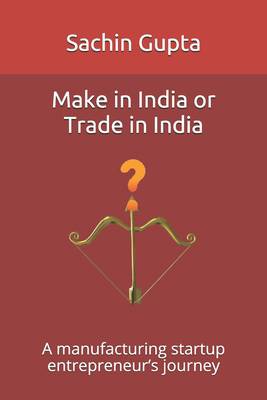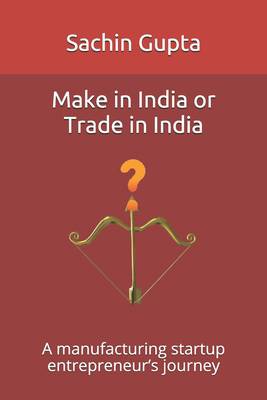
- Retrait gratuit dans votre magasin Club
- 7.000.000 titres dans notre catalogue
- Payer en toute sécurité
- Toujours un magasin près de chez vous
- Retrait gratuit dans votre magasin Club
- 7.000.000 titres dans notre catalogue
- Payer en toute sécurité
- Toujours un magasin près de chez vous
Make in India or Trade in India
A manufacturing startup entrepreneur's journey
Sachin Gupta
Livre broché | Anglais
10,95 €
+ 21 points
Description
Has the Make in India program been helpful to the manufacturing startup entrepreneurs in India? The book answers this question. This is a real book by a real manufacturing startup entrepreneur. The book is not the result of an intellectual brainstorming session among so-called experts who have no ground experience. Rather, this is a genuine human story comprising of the true events in the startup journey of a manufacturing entrepreneur in India. * Therefore, there are no views. There are only facts. * The challenges faced by a manufacturing startup entrepreneur in India are documented in this book. * The book looks at the 'Make in India' program from a startup entrepreneur's perspective. * The book highlights the reasons as to why Indian entrepreneurs are becoming traders and not manufacturers. * Despite the launch of the Make in India initiative in 2014, as per a study by Nomura (A Japanese Financial Group), between the period April 2018 to August 2019, a total of 56 global manufacturing companies shifted their production base from China. However, only 3 came to India. Whereas 26 of those companies relocated to Vietnam, 11 to Taiwan, and 8 to Thailand. Why? The book provides answers to these questions. * The book also covers as to why 'Make in India' policy shall also focus on encouraging startups in addition to attracting the global companies to India. * The book analyzes the reasons as to why entrepreneurs across India are buying goods from China and selling them in India. From simple common household items like 'Chappal' to 'Agarbatti' to 'Diwali Lights' to 'Holi Pichkaris' to 'Toys' to electrical items such as 'switches' to 'fans' to 'LED' to even our 'Gods' sculptures' are being sourced from China and sold in India. * The book analyzes the reasons for India's massive trade deficit with China (60 + Billion USD). * The book suggests solutions to reduce India's trade deficit with China that in turn can result in massive job creation in the manufacturing sector in India thereby giving a boost to India's GDP growth. * The book also suggests solutions to succeed in the Make in India project besides making Indian manufacturing globally competitive. * Rising wages in China since 2006 should have been an ideal opportunity for India to become a manufacturing superpower, however, as per the world bank data, as of 2018, India's manufacturing output was merely 403 billion US$ in comparison to China's manufacturing output of approximately 4.003 trillion US$. Why? * Recent events such as the Coronavirus global pandemic further presents an opportunity for India to succeed in the Make in India project, however, are our policymakers ready? Are our policymakers willing to listen to the entrepreneurs and make necessary changes in the policy framework?
Spécifications
Parties prenantes
- Auteur(s) :
- Editeur:
Contenu
- Nombre de pages :
- 242
- Langue:
- Anglais
Caractéristiques
- EAN:
- 9798605698913
- Date de parution :
- 05-02-20
- Format:
- Livre broché
- Format numérique:
- Trade paperback (VS)
- Dimensions :
- 152 mm x 229 mm
- Poids :
- 358 g







